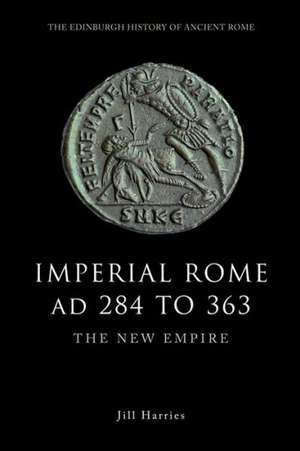Imperial Rome Ad 284 to 363: The New Empire: Edinburgh History of Ancient Rome
Autor Jill Harriesen Limba Engleză Hardback – 5 mar 2012 – vârsta de la 22 ani
Preț: 737.79 lei
Preț vechi: 889.27 lei
-17% Nou
Puncte Express: 1107
Preț estimativ în valută:
141.20€ • 145.86$ • 117.51£
141.20€ • 145.86$ • 117.51£
Carte tipărită la comandă
Livrare economică 26 martie-09 aprilie
Preluare comenzi: 021 569.72.76
Specificații
ISBN-13: 9780748620524
ISBN-10: 0748620524
Pagini: 384
Ilustrații: 50 black & white illustrations, 1 maps
Dimensiuni: 157 x 234 x 23 mm
Greutate: 0.77 kg
Editura: EDINBURGH UNIVERSITY PRESS
Seria Edinburgh History of Ancient Rome
ISBN-10: 0748620524
Pagini: 384
Ilustrații: 50 black & white illustrations, 1 maps
Dimensiuni: 157 x 234 x 23 mm
Greutate: 0.77 kg
Editura: EDINBURGH UNIVERSITY PRESS
Seria Edinburgh History of Ancient Rome
Notă biografică
Jill Harries is Professor of Ancient History and head of school at the University of St Andrews. Her books include Sidonius Apollinaris and the Fall of Rome (Oxford University Press, 1994) and Law and Empire in Late Antiquity (Cambridge University Press 1999, paperback 2001).
Cuprins
Maps and illustrations; Preface; Abbreviations; Chapter 1, The Long Third Century; Chapter 2, Four lords of the world, AD 284-311; Chapter 3, The Empire renewed; Chapter 4, The Return of the Old Gods; Chapter 5, The victory of Constantine; Chapter 6, Towards the sunrise: Constantine Augustus; Chapter 7, Constructing the Christian emperor; Chapter 8, The sons of Constantine; Chapter 9, Warfare and Imperial Security AD 337-361; Chapter 10, Church and Empire; Chapter 11, Images of women; Chapter 12, Rome and Antioch; Chapter 13, Julian Augustus; Chapter 14, The funeral director; Chronology; Guide to Further Reading; Bibliography of Modern Works Cited; Index.
Recenzii
This elegant and exciting book offers a fresh approach to understanding "early" late Antiquity. The breadth of vision is impressive. Jill Harries' triumph is to place Constantine and his promotion of Christianity in the context of a fully-rounded history of the Roman Empire from Diocletian to Julian. -- Dr Christopher Kelly, University of Cambridge



